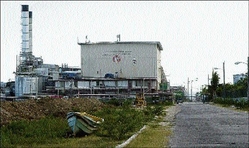Gov't technocrats flay JPS over energy price - State advisers urge quick replacement of old generators
Published: Wednesday | September 9, 2009

JPS power plant in Old Harbour Bay. - file
Government's energy technocrats are calling for the acceleration of the schedule for retiring Jamaica Public Service Company's (JPS) existing power-generating plants, which they contend are outdated and are contributing to the high cost of energy, one of the factors said to be hobbling the local productive sector.
But the monopoly electricity distributor has shot back, deflecting to the utilities regulator, the Office of Utilities Regulation (OUR), responsibility for any speeding up of the phasing out of existing power-generating methodologies and stepping up energy-efficient generating capacity.
"There are some clunkers in the system, units 1,2,3 and 4 in Old Harbour and the B6 at Hunts Bay have a poor heat rate and are wasting fuel, and together account for at least 300 megawatts of electricity," Dr Audley Darmand, engineering lecturer at the University of Technology and government adviser on energy, has said.
Cost to country
Darmand is more concerned about the foreign-exchange cost to the country and long-term savings than any short-term energy price reductions for consumers.
"At some point, if we bite the bullet, put new units in place and also bring LNG on stream, while the cost is going to go up for the consumer, we will begin to have less price increases, but if that is not done, it might be to the country's sorrow," he told Wednesday Business.
The JPS has not made public any timeline for changing existing mainly diesel generators at its power plants.
Meanwhile, energy consultant at the state owned Petroleum Corporation of Jamaica (PCJ), Dr Raymond Wright, is among those gunning for drastic changes to pull down energy costs. He believes the changeover should begin as early as 2011.
"In all fairness, this changeover cannot be done in one swoop. For Old Harbour it would take them about five to six years to make that changeover, which would bring us to 2015 and beyond, therefore the earlier they begin to put things in place, the better," Wright said.
But nobody appears to have a fix on the savings that might accrue from a switch to cleaner energy or more efficient power generation.
"You are asking for some numbers which are yet to be determined," said Wright.
"That is presently part of a serious economic study. Any number that one is giving you at this time would be virtually useless."
In its defence the JPS, which has some 594,000 customers, of which a mere one per cent or 6,000 are manufacturers, says its not to be blamed solely for any delay in upgrading its power generation infrastructure.
"JPS cannot arbitrarily jump up and add new capacity - the OUR has to give approval based on submissions made by ourselves, as well as other players in the sector for the addition of new capacity," JPS' corporate communication head, Winsome Callum responded.
The JPS contends that there has to be a parallel plan in tandem with the retirement of the units. It did not elaborate on the required parallel plan.
Neither is the JPS willing to accept blame for the demise of the country's productive sector, said to be reeling from high electricity costs set at $8.93 per kilowatt hour.
"Undoubtedly energy costs are high, but is not the only thing impacting the productive sector," according to Callum.
She pointed to an article published in a local newspaper a few months ago by James Moss Solomon, past president of the Jamaica Chamber of Commerce and head of the regional grouping of business and industry to support her company's position.
Giving industry costs, the article attributed between 62 and 70 per cent to raw materials, up to 16.4 per cent to wages, and only between 1.6 per cent and 2.4 per cent to electricity costs.
Productive sector malaise
But this has not prevented the government technocrats from insisting that electricity costs are contributing significantly to the malaise in the local productive sector.
"It is a blatant necessity that we reduce the cost of electricity in Jamaica if we are to proceed in respect of commerce, manufacturing and even the hospitality industry," Wright has said, painting a dismal economic outlook if the status quo prevails.
"The tourism or hotel industry is suffering heavily from the high cost of electricity, (while) manufacturing has essentially disappeared from Jamaica."
While quick to point out that a mix of reasons precipitated the near total closure of the bauxite industry, the PCJ consultant is arguing that the sector's energy cost, which constitutes 49 per cent of the country's almost US$3 billion oil bill, was a key factor.
Darmand describes the energy bill as the manufacturer's biggest albatross.
"If the productive sector is to expand, we have to optimise the system quickly, so that these manufacturers can be competitive in the CSME region. We need to do it quickly so that the energy cost can be reduced and people will start to gravitate towards Jamaica."
The light and power company currently has an application for a 23 per cent rate increase before the OUR and links the approval of the price hike requests with its ability to invest further in its generation and distribution infrastructure.
"The need for new investments and capacity was the basis on which the application for a rate increase was made," Callum said.
Even as it awaits a decision, last weekend the JPS announced it was investing US$9.5 million to add approximately 11 megawatts of new generating capacity at its Bogue Power Station in Montego Bay and spending


















